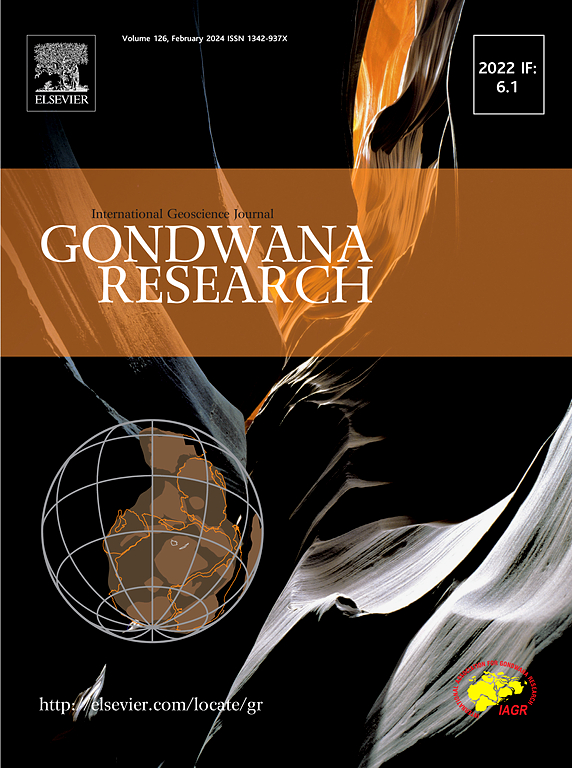Strategic insights into geosustainable Excellence: Unveiling a Resource-Based dynamic approach in global food supply chains for carbon neutrality and economic performance
IF 7.2
1区 地球科学
Q1 GEOSCIENCES, MULTIDISCIPLINARY
引用次数: 0
Abstract
In food-centric nations, such as Vietnam, the roles of (1) organizations, (2) the supply chain, and (3) the government are explained theoretically. This study centers on clarifying the influence of each of these determinants on geosustainable performance in terms of carbon neutrality and economics. This research also provides insight into the moderating role of the Food Safety Management System 4.0 (FSMS 4.0). From 225 replies obtained from Vietnamese organizations, we determined that our model could account for 61.4% Carbon Neutrality and 30.5% Economic Performance. As justified by the hypothesis testing, “Top management support,” “Human resource management,” “Infrastructure,” and “Integration” play contributory roles in fostering Carbon Neutrality. Two elements that have only a negligible impact on achieving carbon neutrality are “External assistance” and “Food safety administration.” Irrespective of no prominent influence on Carbon Neutrality, “Food safety administration” has an appreciable and statistically significant impact on Economic Performance. Regarding FSMS 4.0, while Carbon Neutrality bears the negative influence of “Ecosystem” and “Robustness” when engaging with “Food safety administration,” the opposite —a positive impact of the interaction between “Quality standard” and “Integration”—is witnessed on Carbon Neutrality. This study makes three contributions to the current body of knowledge. First, leveraging a plethora of FSMS 4.0-level-specific factors, this research expands resource-based dynamic theory. Second, this research highlights the importance of external FSMS 4.0 activities, such as stakeholder participation and support from various sources, in providing both commercial and regulatory insights into the key determinants of FSMS 4.0 implementation. In addition, as one of the first studies to shed light on the correlation between an organization’s carbon neutrality commitment and its geosustainable performance, as influenced by the determinants, this research could serve as an ideal motivator for businesses in the food supply chain to embark on their carbon neutrality journeys. Through a multi-level lens, our study investigates the extent to which stakeholder influence and institutional requirements can exert an impact on the deployment of an efficacious FSMS 4.0 to promote and reinforce carbon neutrality and geosustainable performance. This lays the groundwork for enriching existing literature.

对地球可持续卓越的战略见解:在全球食品供应链中揭示以资源为基础的动态方法,以实现碳中和和经济绩效
在以食品为中心的国家,如越南,从理论上解释了(1)组织,(2)供应链和(3)政府的作用。本研究的重点是阐明这些决定因素对碳中和和经济方面的地质可持续绩效的影响。本研究也提供了洞察食品安全管理体系4.0 (FSMS 4.0)的调节作用。从越南组织收到的225份回复中,我们确定我们的模型可以占61.4%的碳中和和30.5%的经济绩效。假设检验证明,“高层管理支持”、“人力资源管理”、“基础设施”和“整合”在促进碳中和方面发挥了贡献作用。“外部援助”和“食品安全管理”这两个要素对实现碳中和的影响微不足道。尽管对碳中和没有显著影响,但“食品安全管理”对经济绩效有可观的、统计上显著的影响。在FSMS 4.0中,碳中和在“食品安全管理”中受到“生态系统”和“稳健性”的负面影响,而在“质量标准”和“整合”之间的互动中则出现了相反的积极影响。这项研究对当前的知识体系有三个贡献。首先,利用大量FSMS 4.0级别的特定因素,本研究扩展了基于资源的动态理论。其次,本研究强调了外部FSMS 4.0活动的重要性,例如利益相关者的参与和各种来源的支持,为FSMS 4.0实施的关键决定因素提供了商业和监管方面的见解。此外,作为首批揭示组织碳中和承诺与其地理可持续绩效之间相关性的研究之一,该研究可以作为食品供应链中企业开始其碳中和之旅的理想激励因素。通过多层次的视角,我们的研究调查了利益相关者的影响和制度要求在多大程度上可以对有效的FSMS 4.0的部署产生影响,以促进和加强碳中和和地质可持续绩效。这为丰富现有文学奠定了基础。
本文章由计算机程序翻译,如有差异,请以英文原文为准。
求助全文
约1分钟内获得全文
求助全文
来源期刊

Gondwana Research
地学-地球科学综合
CiteScore
12.90
自引率
6.60%
发文量
298
审稿时长
65 days
期刊介绍:
Gondwana Research (GR) is an International Journal aimed to promote high quality research publications on all topics related to solid Earth, particularly with reference to the origin and evolution of continents, continental assemblies and their resources. GR is an "all earth science" journal with no restrictions on geological time, terrane or theme and covers a wide spectrum of topics in geosciences such as geology, geomorphology, palaeontology, structure, petrology, geochemistry, stable isotopes, geochronology, economic geology, exploration geology, engineering geology, geophysics, and environmental geology among other themes, and provides an appropriate forum to integrate studies from different disciplines and different terrains. In addition to regular articles and thematic issues, the journal invites high profile state-of-the-art reviews on thrust area topics for its column, ''GR FOCUS''. Focus articles include short biographies and photographs of the authors. Short articles (within ten printed pages) for rapid publication reporting important discoveries or innovative models of global interest will be considered under the category ''GR LETTERS''.
 求助内容:
求助内容: 应助结果提醒方式:
应助结果提醒方式:


